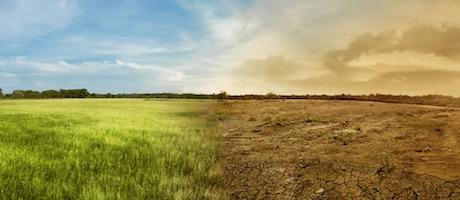
By Sangeeta Waldron — Last month, then-Defence Secretary, Sir Michael Fallon, dismissed complaints that the UK's response to the devastation of the British Virgin Islands by Hurricane Irma was "found wanting" and that it was slower than France and the Netherlands. The British Overseas Territories are self-governing, but rely on the UK for protection from natural disasters.
In India, the farming sector is in deep distress and comes after the country’s lack of rainfall for two consecutive years in 2014 and 2015. It’s estimated that production of kharif crops such as rice, cotton, turmeric, maize etc will decline by 2.8% this year because of an uneven monsoon; and the likelihood of such weather events is likely to increase in the future. This will be a serious challenge for a country like India where about 50% of the population directly or indirectly depends on agriculture for a livelihood.
Now, the International Monetary Fund has told rich countries they must do more to help poor nations cope with climate change or suffer from the weaker global growth and higher migration flows that will happen. In Chapter 3 of its publication, World Economic Outlook, the IMF states that low-income countries have contributed little to increase the greenhouse gas concentrations and cannot afford to tackle the problem from their own limited resources. Hence, the international community will have key role to play in fostering and coordinating financial and other types of support for affected low-income countries. Especially, as the advanced and emerging market economies have largely contributed to the warming that has occurred so far, and which is projected to continue. Helping low-income countries cope with these consequences is a humanitarian need that also makes sound global economic policy.
The chapter explains that global temperatures have increased at an unprecedented pace over the past 40 years, and significant further warming could occur, depending on our ability to restrain greenhouse gas emissions. It finds that increases in temperature have uneven macroeconomic effects, with adverse consequences concentrated in countries with relatively hot climates, such as most low-income countries. In these countries, a rise in temperature lowers per capita output, in both the short and medium term, by reducing agricultural output, suppressing the productivity of workers exposed to heat, slowing investment and damaging health.
The chapter also focuses on the impact of weather shocks in low-income countries, yet most countries will feel direct negative effects from unmitigated climate change through warming above optimal levels in currently cooler countries, more frequent natural disasters, rising sea levels, loss of biodiversity and adverse spillovers from vulnerable countries. Looking ahead, only continued international cooperation and concerted efforts to stem the man-made causes of global warming can limit the long-term risks of climate change.
If the Earth continues to warm over the rest of the 21st century in the same pattern as over the past 50 years, then this IMF chapter may provide valuable guidance on climate change vulnerabilities and adaptation needs under the current production technologies and geographic distribution of populations.
Photo Credit: IMF
TriplePundit has published articles from over 1000 contributors. If you'd like to be a guest author, please get in touch!














